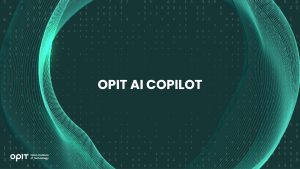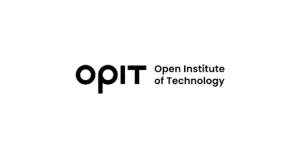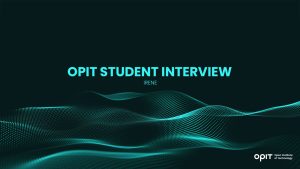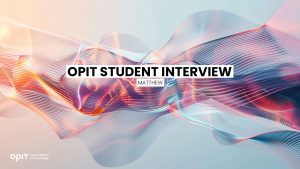By Stephanie Mullins
Studying Online with OPIT
Search inside The Magazine

Artificial Intelligence (AI) is having a profound impact on every aspect of our lives, and education is no exception. But leveraging AI to produce better learning outcomes requires intelligent strategies directed by experienced educational professionals. This is what the Open Institute of Technology (OPIT) is working to achieve with its new OPIT AI Copilot.
OPIT is a pioneering global online university that delivers accessible and flexible courses designed to prepare people for future careers in which technology is constantly improving and evolving. And OPIT AI Copilot is now part of this, helping students manage their course load and personalize their learning, while teaching AI applications in practice.
OPIT’s Vision
OPIT was founded to fill a gap in the education market, as traditional university courses struggle to keep pace with fast-changing technology. It builds its curriculum around current cutting-edge technology and staffs its faculty with experts who are not just teachers but also active, leading professionals in the field of artificial intelligence. This is in addition to courses that combine theory with practical application.
OPIT also believes that education should be accessible for all. Their flexible online approach means that busy professionals can study while continuing their careers, and everyone can access quality education no matter where they are in the world. OPIT serves more than 350 students from 80 countries, including emerging nations like Nigeria, Ghana, and Kenya.
OPIT AI Copilot is part of this vision. The groundbreaking AI agent acts as a personal tutor, available 24/7, bridging time zones and providing real-time support. The agent also can personalize how it delivers content, adapting it based on the needs of the student, including their preferred learning style, pre-existing knowledge, learning pace, preferred language, and more. This is a major step toward overcoming the issue of the prevalent “one-size-fits-all” approach to education, which may be practical for teaching large groups but is an ineffective approach to learning.
Training and Development
The effectiveness of education AI agents depends on the quality and breadth of their training material. OPIT AI Copilot stands out for being trained on OPIT’s entire education archive. This includes 3,500 hours of video content from 131 courses, plus 3,000 proprietary documents, including 320 certified assessments.
Developed by an in-house team of dedicated faculty, engineers, and researchers, the OPIT AI Copilot is one of the first deeply integrated AI systems of its kind in a European institution. In-house development ensures that the AI agent is aligned with OPIT’s educational philosophy and approaches.
Capabilities and Features
OPIT AI Copilot is designed to be a dynamic and multi-faceted assistant with a wide range of functionality. Principal among them are:
- Personalized Learning Support: OPIT AI Copilot provides real-time, personalized guidance that adapts to a student’s progress. It can link directly to relevant sources within the virtual learning environment and adjust its support based on where the student is in their course modules. It avoids revealing information from unreleased modules, ensuring a structured and integrated learning experience.
- Contextual Assistance: As well as drawing from existing material, OPIT AI Copilot can generate content to deepen the learning experience, such as code samples and practice exams. It can also answer questions posed by the student, with responses grounded in the official course materials.
- Academic Integrity during Exams: During examinations, OPIT AI Copilot automatically shifts into “anti-cheating mode,” during which it restricts direct answers on exam topics and functions solely as a basic research tool, promoting self-driven learning and ensuring academic integrity.
- 24/7 Availability: The AI assistant operates and interacts continuously, providing round-the-clock support, which is invaluable for students across different time zones.
Benefits for Students: Enhanced Learning and Support
Having access to OPIT’s AI Copilot as a dedicated learning assistant has various benefits for students engaged in one of OPIT’s courses:
- Personalized Learning Journey: Students receive tailored support that adapts to their individual pace and learning style.
- Instant Access to Information: Immediate feedback promotes faster learning and boosts motivation, leading students to achieve better learning results.
- Improved Study Habits: Features like exam simulations and the ability to download summaries and concept maps empower students to study more effectively.
- Flexibility for Working Professionals: 24/7 availability and adaptive learning modes are particularly beneficial for students juggling study around other commitments such as work and family.
Benefits for Teachers and Faculty
While we often focus on the benefit for students, OPIT AI Copilot also benefits teachers and faculty to do their jobs better.
- Automated Grading: Automated grading of multiple-choice and single-answer exams lets students get their results immediately. The agent can also provide preliminary grades on longer written exams, assessing structure and grammar, and checking for the inclusion of key concepts. This again gives students immediate feedback while waiting for final marks and gives teachers an unbiased guide to help them verify that they are grading fairly.
- Generation of Learning Materials: Teachers can leverage OPIT AI Copilot to generate new learning materials, quizzes, and feedback rubrics, based on the core materials that they have prepared and gathered. They can also use the tool to find related new publications and materials for review and possible inclusion in the course. This saves teachers time as they expand and refine their curriculum materials.
- Scalability: The AI system allows OPIT to scale its educational offerings and support services more effectively, accommodating a growing international student body without a proportional increase in human resources.
- Pioneering Educational Technology: By integrating such an advanced AI system, OPIT positions itself as a leader in educational technology, attracting students and faculty who are keen on innovation and future-proof learning models.
OPIT AI Copilot currently saves teachers up to 30% of their time, allowing them and other faculty to focus on activities such as personalized instruction, one-on-one mentorship, refining teaching methodologies, fostering deeper student engagement, and exploring innovative pedagogical approaches.
The Future of Education With OPIT AI Copilot
The launch of OPIT AI Copilot, unveiled at Microsoft’s “AI Agents and the Future of Higher Education” event in Milan, marked a significant milestone in online education. As Professor Francesco Profumo, Rector of OPIT and former Italian Minister of Education, aptly put it, “AI is no longer just a tool: it’s an environment, a context that radically changes how we learn, teach, and create.” He emphasized that while AI offers immense potential, it also presents a cultural, ethical, and pedagogical challenge that requires courage to rethink traditional models and build solid bridges between human and artificial intelligence.
Riccardo Ocleppo, founder and director of OPIT, reinforced this vision: “We want to put technology at the service of higher education. We’re ready to develop solutions not only for our students, but also to share with other global institutions that are eager to innovate the learning experience, to face a future in education that’s fast approaching.”




Source:
- Il Sole 24 Ore, published on June 23rd, 2025
At its core is a teaching heritage made up of 131 courses, 3,500 hours of video, 1,800 live sessions

During the Open Institute of Technology’s (OPIT) 2025 graduation day, the OPIT team interviewed graduating student Irene about her experience with the MSc in Applied Data Science and AI. The interview focused on how Irene juggled working full-time with her study commitments and the value of the final Capstone project, which is part of all OPIT’s master’s programs.
Irene, a senior developer at ReActive, said she chose to study at OPIT to update her skills for the current and future job market.
OPIT’s MSc in Applied Data Science and AI
In her interview, Irene said she appreciated how OPIT’s course did not focus purely on the hard mathematics behind technologies such as AI and cloud computing, but also on how these technologies can be applied to real business challenges.
She said she appreciated how the course gave her the skills to explain to stakeholders with limited technical knowledge how technology can be leveraged to solve business problems, but it also equipped her to engage with technical teams using their language and jargon. These skills help graduates bridge the gap between management and technology to drive innovation and transformation.
Irene chose to continue working full-time while studying and appreciated how her course advisor helped her plan her study workload around her work commitments “down to the minute” so that she never missed a deadline or was overcome by excessive stress.
She said she would recommend the program to people at any stage in their career who want to adapt to the current job market. She also praised the international nature of the program, in terms of both the faculty and the cohort, as working beyond borders promises to be another major business trend in the coming years.
Capstone Project
Irene described the most fulfilling part of the program as the final Capstone project, which allowed her to apply what she had learned to a real-life challenge.
The Capstone Project and Dissertation, also called the MSc Thesis, is a significant project aimed at consolidating skills acquired during the program through a long-term research project.
Students, with the help of an OPIT supervisor, develop and realize a project proposal as part of the final term of their master’s journey, investigating methodological and practical aspects in program domains. Internships with industrial partners to deliver the project are encouraged and facilitated by OPIT’s staff.
The Capstone project allows students to demonstrate their mastery of their field and the skills they’ve learned when talking to employers as part of the hiring process.
Capstone Project: AI Meets Art
Irene’s Capstone project, “Call Me VasarAI: An AI-Powered Framework for Artwork Recognition and Storytelling,” focused on using AI to bridge the gap between art and artificial intelligence over time, enhancing meaning through contextualization. She developed an AI-powered platform that allows users to upload a work of art and discover the style (e.g. Expressionism), the name of the artist, and a description of the artwork within an art historical context.
Irene commented on how her supervisor helped her fine-tune her ideas into a stronger project and offered continuous guidance throughout the process with weekly progress updates. After defending her thesis in January, she noted how the examiners did not just assess her work but guided her on what could be next.
Other Example Capstone Projects
Irene’s success is just one example of a completed OPIT Capstone project. Below are further examples of both successful projects and projects currently underway.
Elina delivered her Capstone project on predictive modeling of natural disasters using data science and machine learning techniques to analyze global trends in natural disasters and their relationships with climate change-related and socio-economic factors.
According to Elina: “This hands-on experience has reinforced my theoretical and practical abilities in data science and AI. I appreciate the versatility of these skills, which are valuable across many domains. This project has been challenging yet rewarding, showcasing the real-world impact of my academic learning and the interdisciplinary nature of data science and AI.”
For his Capstone project, Musa worked on finding the optimal pipeline to fine-tune a language learning model (LLM) based on the specific language and model, considering EU laws on technological topics such as GDPR, DSA, DME, and the AI Act, which are translated into several languages.
Musa stated: “This Capstone project topic aligns perfectly with my initial interests when applying to OPIT. I am deeply committed to developing a pipeline in the field of EU law, an area that has not been extensively explored yet.”
Tamas worked with industry partner Solergy on his Capstone project, working with generative AI to supercharge lead generation, boost SEO performance, and deliver data-driven marketing insights in the realm of renewable energy.
OPIT’s Master’s Courses
All of OPIT’s master’s courses include a final Capstone project to be completed over one 13-week term in the 90 ECTS program and over two terms in the 120 ECTS program.
The MSc in Digital Business and Innovation is designed for professionals who want to drive digital innovation in both established companies and new digital-native contexts. It covers digital business foundations and the applications of new technologies in business contexts. It emphasizes the use of AI to drive innovation and covers digital entrepreneurship, digital product management, and growth hacking.
The MSc in Responsible Artificial Intelligence combines technical expertise with a focus on the ethical implications of modern AI. It focuses on real-world applications in areas like natural language processing and industry automation, with a focus on sustainable AI systems and environmental impact.
The MSc in Enterprise Cybersecurity prepares students to fulfill the market need for versatile cybersecurity solutions, emphasizing hands-on experience and soft-skills development.
The MSc in Applied Data Science and AI focuses on the intersection between management and technology. It covers the underlying fundamentals, methodologies and tools needed to solve real-life business problems that can be approached using data science and AI.

Quality of faculty: that’s what compelled Matthew Belcher, an independent freelance web developer and student working towards a Bachelor in Computer Science, to enroll in the Open Institute of Technology (OPIT), allowing him to work with some of the top professionals in his chosen industry.
Matthew was recently elected program representative for the course, helping to guide the interests of over 100 students across the globe in discussions with the area chair and director to ensure that the course is fit for purpose and meets student needs.
Why OPIT?
In a recent interview, Matthew told us that the reason he chose OPIT to continue his education was the expertise of the faculty. He shared that he conducted intensive research into a variety of programs that would help him shape his interest and skill in technology into potential career opportunities.
Matthew felt that the OPIT faculty stood out as not just great teachers, but top-tier professionals with real-world experience in the kinds of industries he wants to work in. Their professional roles mean they offer an up-to-the-minute understanding of the changing market.
The Computer Science Program
The BSc in Computer Science is a fully accredited course delivered completely online over six 13-week terms.
The program delivers foundational skills, both theoretical and practical, in all aspects of computer science, including programming, software development, databases, cloud computing, cybersecurity, data science, and artificial intelligence. Students deliver a dissertation or project in the final term, and in term five, they can choose five electives from a pool of 27, or choose to specialize in one of five fields:
- Data Science and Artificial Intelligence
- Cloud Computing
- Cybersecurity
- Metaverse and Gaming
- Full Stack Development
The BSc in Computer Science is aimed at students interested in software development and engineering, data science, web development, app and game development, IT business analysis, cybersecurity, and database architecture.
Meet the Faculty
Now let’s meet some of the incredible faculty who influenced Matthew’s decision to select OPIT.
Art Sedighi
As well as teaching at OPIT, Art Sedighi is an adjunct professor at Johns Hopkins University and a professor at Purdue University Global. He was previously a partner at CDI Global, a senior cybersecurity solution architect at Amazon AWS, and head of high-performance computing and grid engineering at the Bank of America.
Sedighi has 20 years of experience planning, designing, developing, and having end-to-end ownership of cloud solutions. He has managed cross-functional teams and been responsible for driving adoption strategies across enterprises.
Sedighi teaches software engineering and cloud adoption in the BSc in Computer Science and is also a professor in the BSc in Digital Business program.
Lokesh Vij
As well as teaching in OPIT’s Computer Science Program, Lokesh is a database architect at Broadcom Inc., a semiconductor manufacturing firm in Canada, and a part-time professor at Seneca Polytechnic in Toronto.
Vij describes himself as a cloud and data evangelist, educator, and mentor. With over 20 years of rich experience, he has designed, developed, and delivered enterprise-scale data solutions across disparate source systems, data formats, and relational and non-relational databases.
His proven expertise includes enhancing business profitability by leveraging insights derived from diverse data sets, constructing decision support systems that convert transactional data into analytical formats. This, combined with data visualization techniques, allows him to articulate and clarify business insights effectively.
In the BSc in Computer Science program, he teaches cloud computing infrastructure, cloud development, cloud computing automation and ops, and cloud data stacks. He is also a professor of the BSc in Digital Business and the MSc in Applied Data Science & AI, also covering big data and cloud computing.
Tom Vazdar
Tom Vazdar is OPIT’s area chair for cybersecurity and also the CEO of Riskoria, which focuses on cybersecurity strategies. His areas of expertise include strategy services, AI and cybersecurity, AI infrastructure development, and compliance assurance and risk management.
Vazdar teaches computer security in both the BSc in Computer Science and the BSc in Digital Business programs, as well as for the MSc in Enterprise Cybersecurity.
Sylvester Kaczmarek
Sylvester Kaczmarek is a former Chief Science Officer at WeSpace Technologies and a former AI Mentor and Researcher at NASA. He is now an independent executive leading secure, safe, and resilient AI-driven space innovations, a science communicator, and an advisor to deep tech investors, governments, and startups.
In the past, he has specialized in the integration of artificial intelligence, robotics, cybersecurity, and edge computing in aerospace applications.
In OPIT’s BSc in Computer Science program, Kaczmarek teaches cartography and secure communications, secure software development, and parallel and distributed computing. He also teaches in the MSc in Enterprise Cybersecurity program.
Lorenzo Marvardi
As well as teaching at OPIT, Lorenzo Marvardi is a managing director at Accenture. With a background in cybersecurity management and security consulting, he has 15 years of experience as a security professional and executive, implementing security programs across different industries and geographies.
Marvardi teaches cybersecurity in both the BSc in Computer Science and the BSc in Digital Business programs.
Khaled Elbehiery
Khaled Elbehiery is a senior director and network engineer at Charter Communications. As well as teaching for OPIT, he is a part-time professor at Park University and DeVry University, both in the United States.
He describes himself as a professor, scientist, inventor, and author. He has publications on cloud engineering, quantum computing, space, robotics, bionics, microgravity, and modern educational methodologies.
Elbehiery teaches cloud and IoT security and computer networks on both the BSc in Computer Science and the MSc in Enterprise Cybersecurity programs.
Francesco Derchi
Francesco Derchi is a brand, innovation, and digital expert with over 14 years of experience. He is chair of digital business at OPIT, an advisory board member for Arsene Lippens, on the faculty at EHL in Switzerland and the Universita degli Studi di Genova, plus course director and contributor to the Harvard Business Review Italia.
Derchi teaches business strategy and digital marketing on both the BSc in Computer Science and the BSc in Digital Business, as well as on the MSc in Digital Business and Innovation.

Source:
- EFMD Global, Published on January 30th, 2025.
We spoke to education experts from around the world to find out. From Germany’s Frankfurt School of Finance & Management and Nottingham Business School in the UK to India’s IIM Indore and Italy’s POLIMI Graduate School of Management, here’s what 21 experts actually said…
Sara Ciabattoni, Senior Program Coordinator at OPIT – Open Institute of Technology:
- Master Digital Skills: In today’s fast-evolving digital landscape, it’s essential to master a range of digital tools and platforms. Students should focus not only on developing technical expertise but also on leveraging technology to improve their problem-solving capabilities and drive innovation.
- Focus on Lifelong Learning: The future of work is evolving, bringing challenges but even greater opportunities. The World Economic Forum’s Future of Jobs Report predicts that while some roles will be displaced by technology, even more “jobs of tomorrow” will emerge, underscoring the need to focus on growth rather than disruption. As OPIT Rector Francesco Profumo envisions, education should adopt a circular learning model, much like the circular economy, shifting from a one-time, cradle-to-grave approach to a lifelong cycle of continuous learning. This ensures we stay adaptable and ready for the opportunities of a rapidly changing world.
- Develop Soft Skills: While technical expertise is crucial, employers increasingly prioritise communication, leadership, and collaboration. Cultivating these soft skills alongside academic knowledge will equip students to thrive in the complex, interconnected workplaces of the future.
- Practice Critical Thinking: In an era where information is abundant but not always accurate, students must develop strong critical thinking skills. The ability to evaluate sources, question assumptions, and synthesise new ideas will be essential in making informed decisions.
By prioritising these areas, students can better equip themselves to meet the challenges and seize the opportunities of their academic and professional futures.
Read the full article below:
Have questions?
Visit our FAQ page or get in touch with us!
Write us at +39 335 576 0263
Get in touch at hello@opit.com
Talk to one of our Study Advisors
We are international
We can speak in:
